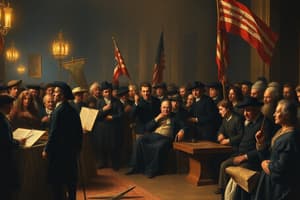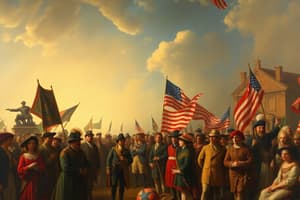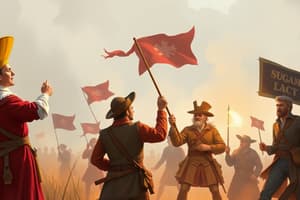Podcast
Questions and Answers
What was the primary reason King George III imposed the Stamp Act?
What was the primary reason King George III imposed the Stamp Act?
- To punish the colonies for protests
- To promote colonial trade
- To raise money for governing the empire (correct)
- To give colonists the right to vote
How did women protest the tax on cloth imported from Britain?
How did women protest the tax on cloth imported from Britain?
- They boycotted all British goods
- They wove their own cloth at home (correct)
- They organized marches
- They petitioned Parliament
What event is known as the Boston Massacre?
What event is known as the Boston Massacre?
- Colonists tossing tea overboard
- A peaceful protest against taxation
- British soldiers firing into a crowd (correct)
- The First Continental Congress meeting
What action did King George III take in response to the Boston Tea Party?
What action did King George III take in response to the Boston Tea Party?
What nickname was given to the laws that punished the colonies following the Boston Tea Party?
What nickname was given to the laws that punished the colonies following the Boston Tea Party?
What was the main purpose of the First Continental Congress?
What was the main purpose of the First Continental Congress?
What was the reaction of the colonial militias when British troops attacked?
What was the reaction of the colonial militias when British troops attacked?
What was a significant division among the colonists regarding their stance towards Britain?
What was a significant division among the colonists regarding their stance towards Britain?
Which tax remained in effect after most taxes were repealed by 1773?
Which tax remained in effect after most taxes were repealed by 1773?
What was the outcome of the events at Lexington and Concord?
What was the outcome of the events at Lexington and Concord?
Flashcards
Stamp Act
Stamp Act
A tax imposed by the British Parliament on all printed materials in the American colonies, requiring a special stamp to be affixed.
Representation and Taxation
Representation and Taxation
The principle that citizens should have a say in the government that taxes them. It was applied to the colonists who argued that they lacked representation in the British Parliament, yet were subject to taxes imposed by it.
Boston Massacre
Boston Massacre
An incident in 1770 where British soldiers fired into a crowd of colonists in Boston, resulting in the death of five people.
Boston Tea Party
Boston Tea Party
Signup and view all the flashcards
Intolerable Acts
Intolerable Acts
Signup and view all the flashcards
First Continental Congress
First Continental Congress
Signup and view all the flashcards
Patriots
Patriots
Signup and view all the flashcards
Loyalists
Loyalists
Signup and view all the flashcards
Militia
Militia
Signup and view all the flashcards
Lexington and Concord
Lexington and Concord
Signup and view all the flashcards
Study Notes
Taxes and Protests
- In 1765, King George III needed money. Parliament imposed the Stamp Act, requiring a tax stamp on all paper goods in the colonies.
- Colonists protested the Stamp Act, arguing they had no representation in Parliament.
- The Stamp Act was repealed.
- Women protested taxes on imported cloth by producing their own.
- The Boston Tea Party occurred in 1773. Colonists dressed as Native Americans and threw tea into Boston Harbor to protest taxes.
Revolution Begins
- King George punished the colonies by closing Boston's port and banning town meetings (Intolerable Acts).
- Patriots favored independence, Loyalists sought peace, and many colonists were ambivalent.
- The First Continental Congress met in 1774 to discuss the conflict with Britain.
- The delegates sent a peace proposal to the King.
- British troops moved to seize colonial weapons in Lexington and Concord in 1775.
- Colonial militias were ready. The militias, which were groups of volunteers, fought the British forces.
- British forces retreated.
Studying That Suits You
Use AI to generate personalized quizzes and flashcards to suit your learning preferences.
Description
Explore the timeline of colonial protests against British taxes, including the Stamp Act and the Boston Tea Party. Understand the early steps towards revolution, the reactions of King George III, and the formation of the First Continental Congress. This quiz covers the key events and figures that influenced the American Revolution.




